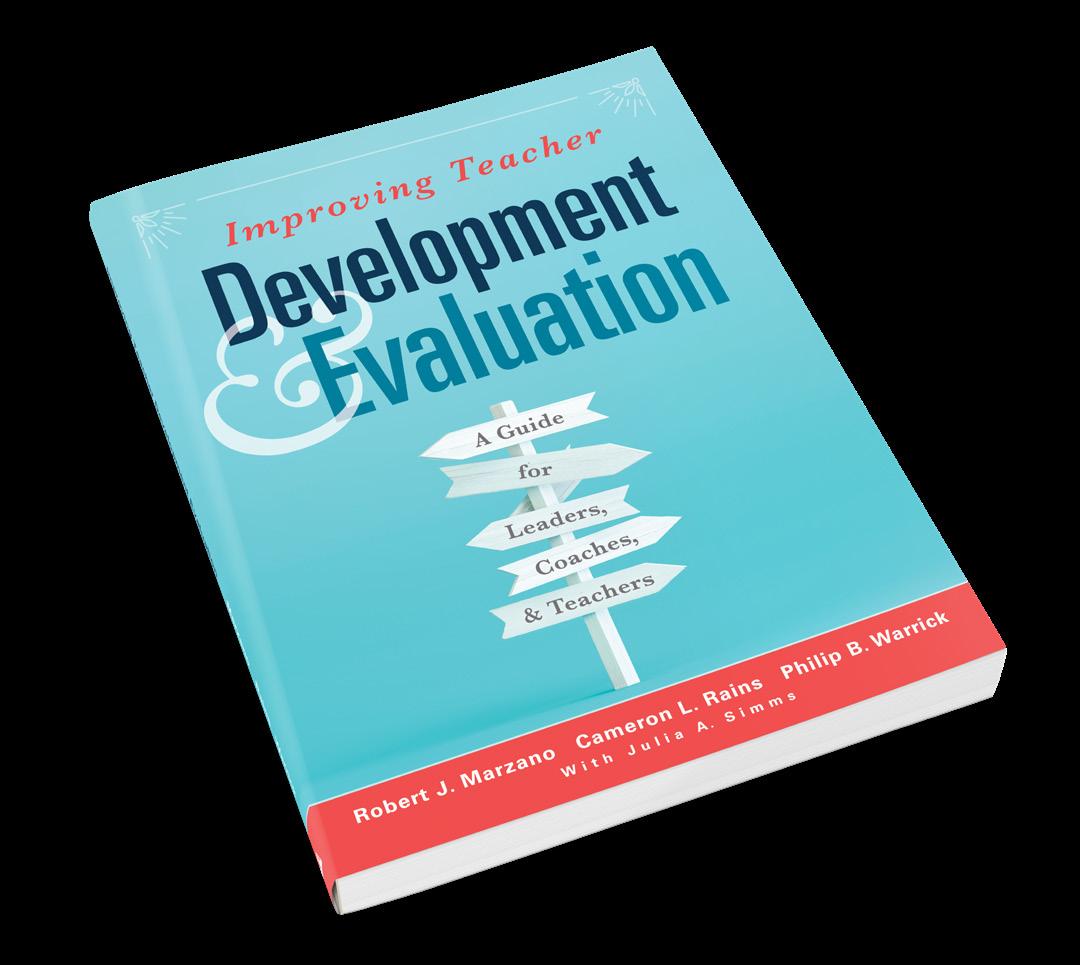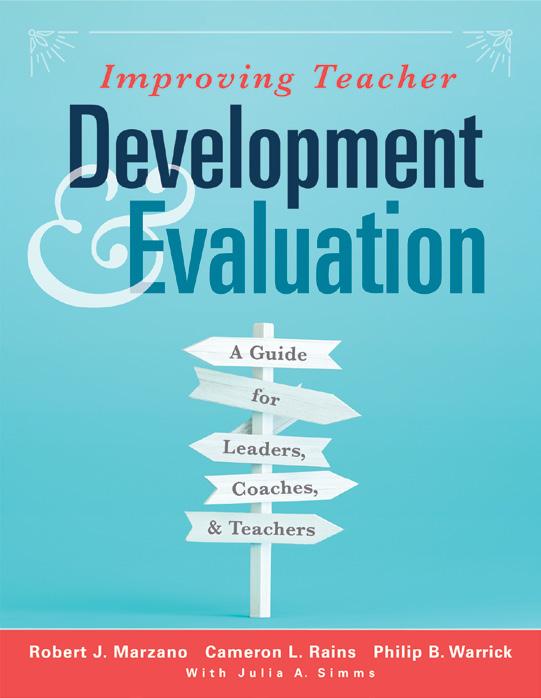
9 minute read
HRS Level 1: Safe, Supportive, and Collaborative Culture
Motivating and Inspiring Students
Strategies to Awaken the Learner
By Robert J. Marzano, Darrell Scott, Tina H. Boogren, and Ming Lee Newcomb Discover a results-driven framework—based on a six-level hierarchy of student needs and goals—that you can use to provide engaging instruction to students.
12MMCA–BKL025 $36.95 ISBN 978-0-9913748-7-8 192 pages
Motivating and Inspiring Students
• Learn the four systems that humans operate under at all times and how these systems impact students and teachers in schools. • Delve into the metacognitive and self-systems hierarchy of goals, and understand how teachers can address these goals in order to reach students’ hearts, heads, and hands.
Managing the Inner World of Teaching
Emotions, Interpretations, and Actions
By Robert J. Marzano and Jana S. Marzano Cultivate a positive mindset, and choose productive actions by examining your emotions and interpretations in the classroom and understanding factors that influence your decisions.
12MMCA–BKL028 $26.95 ISBN 978-0-9903458-3-1 168 pages
PD Topic
Managing the Inner World of Teaching
• Gain an awareness of emotional responses and how they affect interpretations and reactions. • Understand the power of negative emotions and how to mitigate their effects. • Discover a three-phase management process designed to promote awareness, analysis, and choice. • Engage in retrospective and real-time practice exercises for managing the inner world.
Collaborative Teams That Transform Schools
The Next Step in PLCs
By Robert J. Marzano, Tammy Heflebower, Jan K. Hoegh, Philip B. Warrick, and Gavin Grift With Laurel Hecker and Janelle Wills Explore research-based steps and strategies you can use to increase the effectiveness of collaborative teams and enhance professional learning communities.
12MMCA–BKL034 $36.95 ISBN 978-1-943360-03-1 184 pages
BESTSELLER
Published by Solution Tree
180 Days of Self-Care for Busy Educators
By Tina H. Boogren Rely on 180 Days of Self-Care for Busy Educators to help you lead a happier, healthier, more fulfilled life inside and outside of the classroom. With Tina H. Boogren’s guidance, you will work through 36 weeks of self-care strategies during the school year.
12MMCA–BKF920 $31.95 ISBN 978-1-949539-27-1 168 pages
PD Topic
Collaborative Teams That Transform Schools
• Gain an awareness of the research related to the concept of professional learning communities (PLCs). • Explore the context that must surround the establishment and maintenance of collaborative teams.
Published by Solution Tree
Take Time for You
Self-Care Action Plans for Educators
By Tina H. Boogren The key to thriving as a human and an educator rests in self-care. With Take Time for You, you’ll discover a clear path to well-being. The author offers manageable strategies, reflection questions, and surveys that will guide you in developing an individualized self-care plan.
12MMCA–BKF813 $31.95 ISBN 978-1-945349-71-3 152 pages
Finding the Source of Effective Education
By Darrell Scott and Robert J. Marzano Explore strategies to enhance relationships, learn ways to awaken student passion for learning, and cultivate student security, identity, and belonging.
12MMCA–BKL022 $31.95 ISBN 978-0-9913748-1-6 232 pages
Integrating All Three Tiers
By Jason E. Harlacher and Billie Jo Rodriguez Discover how to create an encouraging, productive school culture using the Schoolwide Positive Behavioral Interventions and Supports (SWPBIS) framework.
12MMCA–BKL030 $36.95 ISBN 978-0-9903458-7-9 232 pages
Cultivating Mindfulness in the Classroom
By Jeanie Iberlin With Mike Ruyle Foreword by Robert J. Marzano Discover how to use research-based mindfulness practices to help improve your students’ social and emotional wellness as they learn and grow.
12MMCA–BKL035 $31.95 ISBN 978-1-9433600-9-3 152 pages
Designing Effective Classroom Management
By Jason E. Harlacher Foreword by Robert J. Marzano With this practical, step-by-step guide, teachers and school administrators will uncover five components that help improve student achievement and decrease classroom problems.
12MMCA–BKL029 $31.95 ISBN 978-0-9903458-5-5 168 pages
Awaken the Learner
• Discover ways to create a culture and climate in your classroom that will awaken students to new possibilities. • Explore a model of behavior, decision making, and engagement that illuminates student motivation and actions in the classroom.
PD Topic
An Educator's Guide to Schoolwide Positive Behavioral Interventions and Supports
• Learn the foundational tenets and salient features of SWPBIS. • Understand the four key elements of SWPBIS and what they look like in practice.
PD Topic
Cultivating Mindfulness in Schools
• Develop an understanding of what mindfulness is and what it is not. • Understand the research that supports integrating mindfulness in schools, including the science of mindfulness.
PD Topic
Designing Effective Classroom Management
• Understand five principles of effective classroom management. • Define and teach classroom expectations and rules. • Create classroom structure and procedures.
An Interview with Dr. Robert J. Marzano
Despite nationwide attempts to improve teacher development and evaluation over the last decade, Dr. Robert J. Marzano believes the current system is still in need of a major overhaul.
Dr. Marzano, with more than 50 years of education research, teamed up with Dr. Cameron L. Rains and Dr. Philip B. Warrick to write Improving Teacher Development and Evaluation: A Guide for Leaders, Coaches, and Teachers, a revolutionary book that will transform the approach to teacher development and evaluation.
The result of more than three decades’ worth of research and practice, this new resource confronts the limitations of the current system and outlines
pathways to a better approach.
For too many years, it has been wrongly assumed that teacher development is built into a school or district’s evaluation process, and models of development that are available are not aligned to the scientific findings related to the development of expertise.
“It’s time to make a change in the evaluation process and make a stronger link with teacher development,” said Marzano.
Dr. Marzano pointed out that there are many challenges to teacher growth in a school or district, including lack of access to quality feedback, lack of a model of instruction, and lack of time.
It is organized into two parts, the first focused on teacher development and the latter on teacher evaluation. According to Dr. Marzano, the two should always go hand in hand.

However, he argued, the current paradigm lacks focus on development, instead promoting evaluation systems that fixate on measuring teacher performance.
Dr. Robert J. Marzano To help readers overcome these and other challenges, Dr. Marzano and his coauthors have introduced a
six-step process to increase
teacher development. Aimed at teachers and coaches, this process is backed by extensive research and offers a detailed, step-by-step guide that
guarantees improved quality
of teaching in the classroom.
Dr. Marzano and his colleagues also present research showing the drawbacks of current teacher evaluation practices, including inaccurate effectiveness scores and classifying errors. In some schools and districts, Dr. Marzano warned, these errors could have serious ramifications.
NEW RELEASE

To ensure teachers are evaluated properly, Dr. Marzano and his co-authors advise that administrators follow six principles for observation. They also provide three recommendations for evaluation scores and three recommendations for addressing student growth.

“The current evaluation model is broken,” said Marzano. “It was well-intentioned. It just didn’t work as originally conceptualized. So [the model
we propose] is our attempt to say, ‘Well, what would a better system look like?’”
The book offers a variety of templates, scales, and other tools that educators can use to put the recommended steps for improvement into practice and avoid common pitfalls. It also includes protocols for administrators, a step-bystep guide to ensure classroom observations are valid and reliable, and tips for success that don’t require excessive investments of time.
Dr. Marzano is confident that the strategies presented in Improving Teacher Development and Evaluation can dramatically improve classroom teaching. He and his colleagues spent decades thoroughly investigating teacher evaluation models and the research on cultivating expertise, paying particular attention to “the pieces that are the most accurate, the most useful to both administrators and teachers, and that most add to the profession.” He also ensured that these strategies are designed in a way that can be implemented immediately by teachers, coaches, and leaders in any school or district, regardless of the current model of instruction.
Many of the changes proposed are systemic, Dr. Marzano pointed out, intended not just to apply to a single teacher but to put conditions in place
that will allow teachers to become experts
dedicated to always learning and growing.
Dr. Marzano also emphasized the importance of developing a culture where educators support one another, celebrate strengths, and recognize opportunities for improvement. The school should be a place where learning takes place not just for students, Dr. Marzano believes, but for educators as well.
Although the process of improving teacher development and evaluation requires such large, systemic changes, Dr. Marzano believes it’s necessary in order to address the failures of past evaluation efforts and the stagnancy of teacher growth.
Learn more about this book and related PD on page 16
High Reliability Schools™ | Level 2 Effective Teaching in Every Classroom

Level 2
High-quality instruction is the most important tool educators have at their disposal to positively affect student learning. Level 2 details how to develop and maintain effective instruction in every classroom by building a shared language of instruction and using this common language to raise the level of pedagogical skill both individually and collectively.
NEW RELEASE

Improving Teacher Development and Evaluation
By Robert J. Marzano, Cameron L. Rains, and Philip B. Warrick With Julia A. Simms Teachers cannot become great unless they are given the time, support, and tools to grow in their professional practice. Written for teachers, coaches, and educational leaders, this resource offers a paradigm-shifting approach to teacher development and evaluation. The authors share research-backed steps for improvement, outline the principles for successful observation, and offer extensive protocols designed to help readers fully implement the book’s recommendations.
PD Topic
Improving Teacher Development and Evaluation
• Understand why the professional growth of teachers is vital to the wellbeing of the educational system. • Explore reasons for the failure of past teacher evaluation efforts. • Discover the beneficial influence of teacher self-reflection and self-rating on elements of effective instruction.


